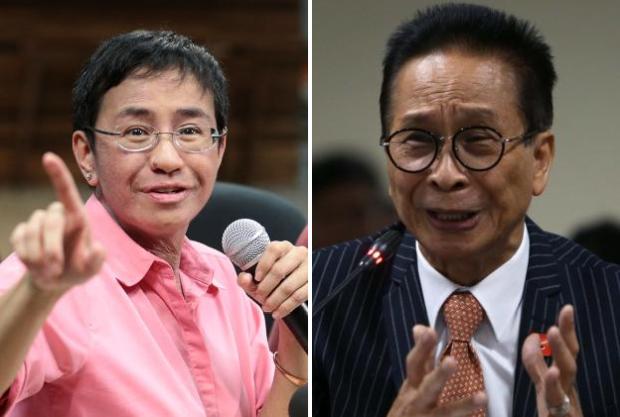Ressa confronts Panelo in radio show over her cases

Credit to Author: Alexander Magno| Date: Sat, 16 Feb 2019 13:56:07 +0000
Rappler chief executive officer Maria Ressa told presidential spokesperson Salvador Panelo in a radio program exchange that the six times she posted bail in a span of just two months were “not regular.”
Ressa and Panelo were guests in “Omaga Diaz Report,” a program anchored Henry Omaga Diaz over AM radio station DZMM on Saturday afternoon.
With Panelo talking through a phone patch and Ressa in the studio, the two guests discussed Ressa’s arrest and overnight detention at the headquarter of the National Bureau of Investigation (NBI) over cyberlibel charges.
READ: Maria Ressa spends night at NBI
“The big picture is I posted bail six times in two months and that is not regular,” Ressa said.
She said she respected the views of Panelo who reiterated over the radio that Ressa’s cyberlibel case had nothing to do with press freedom as this was filed by a private individual, referring to businessman Wilfredo Keng.
Panelo reiterated that President Rodrigo Duterte did not know Keng.
Panelo also denied there were irregularities on the timing of her Feb.13 arrest by NBI agents, saying the arrest warrant was served on a weekday and the agents were not required to show an information sheet as she had wanted.
READ: Rappler’s Maria Ressa arrested for cyberlibel
He said was Ressa was using the issue of freedom of expression against the government because a case had been filed against her.
“She wants special treatment because she did not want the arrest warrant served when the law said it can be served anytime… The law should be similar to all people,” he said.
On the six times Ressa posted bail in two months, he said: “If you were charged six times, then you will post bail six times.”
Ressa said she could counter “every single” one of Panelo’s statements, but this would be a “waste of time” for the people.
She asked Panelo if Rappler reporter Pia Ranada, who was banned from entering the Malacañan Palace premises and to cover presidential events outside, could return as this was a constitutional right.
In reply, Panelo said that, even if Ranada was prohibited from entering the Palace, her forwarded questions were being entertained.
He also said Ranada could write stories even if she was not in Malacanang,
Panelo also made it clear to Ressa his counter statements to her were not his opinion but “is what the law says.”
He maintained that the law was observed in all circumstances. /atm